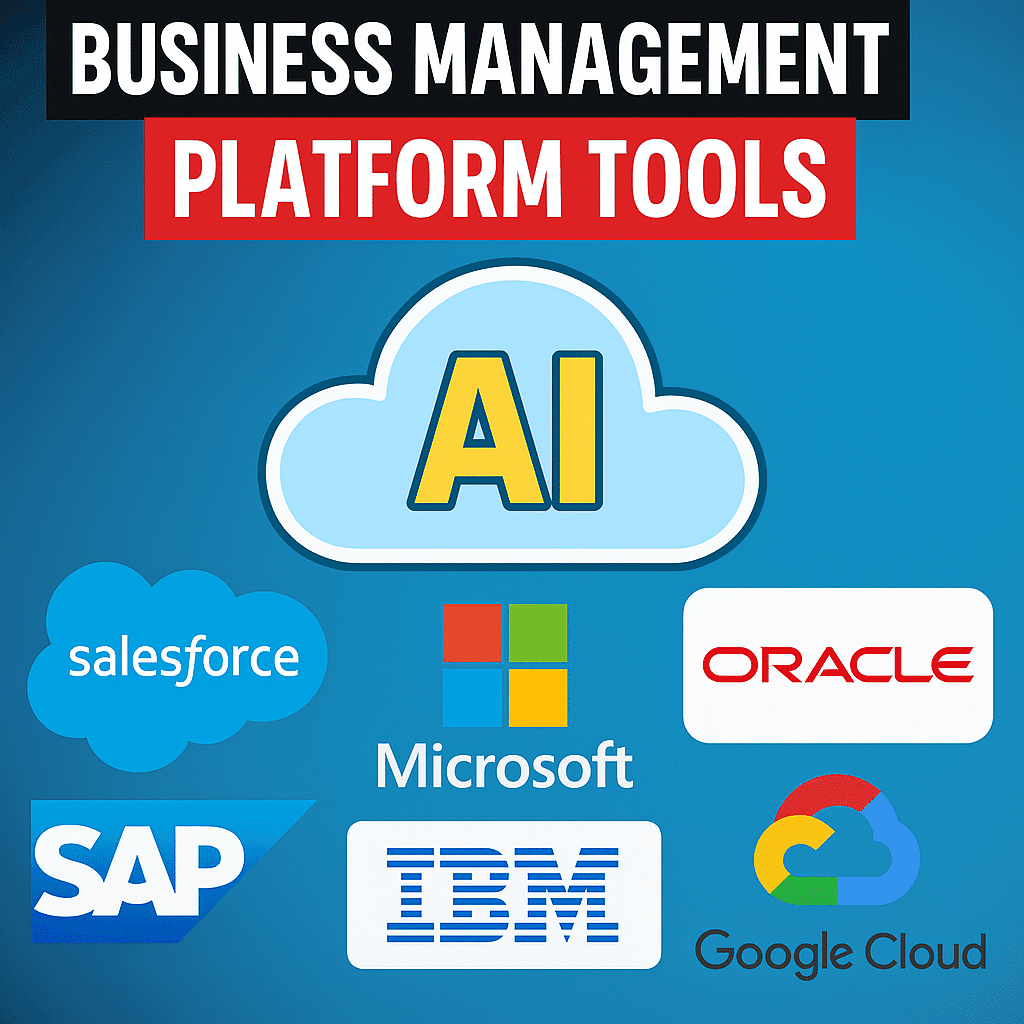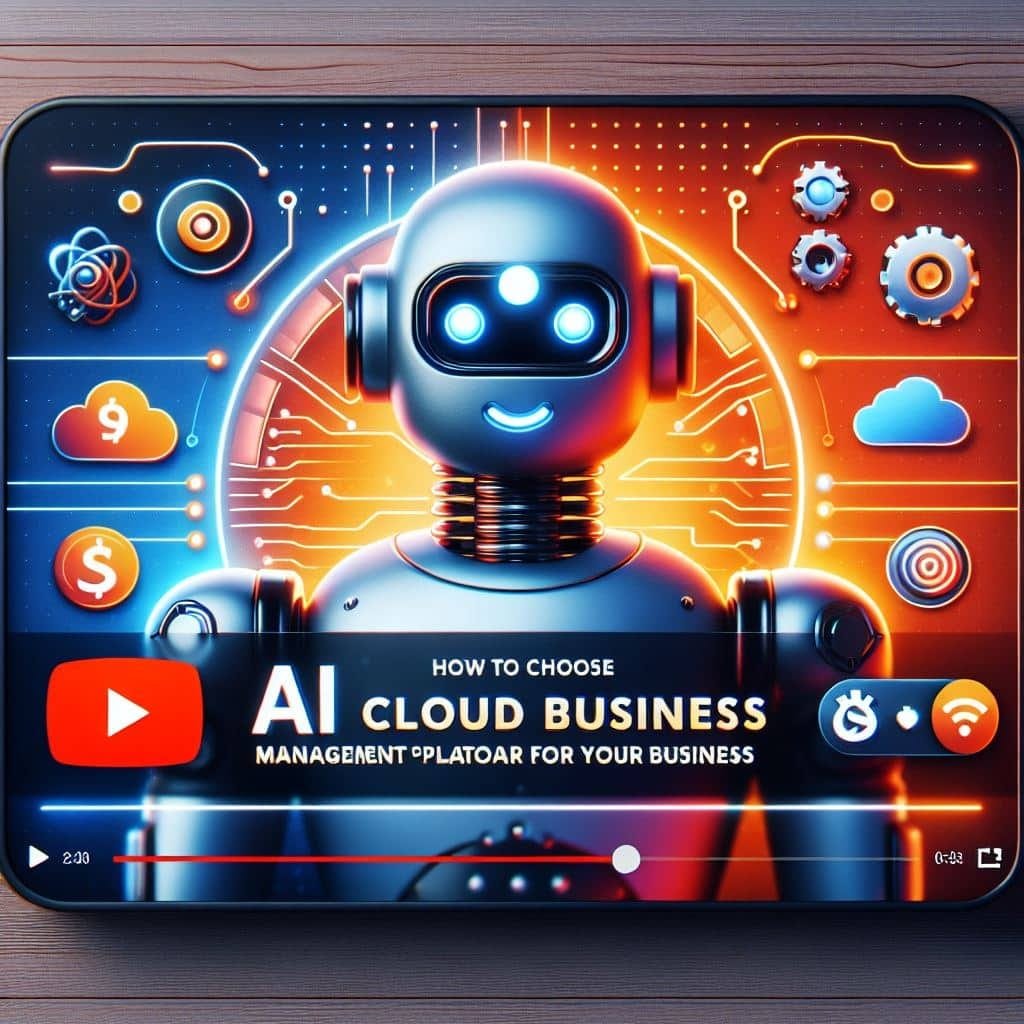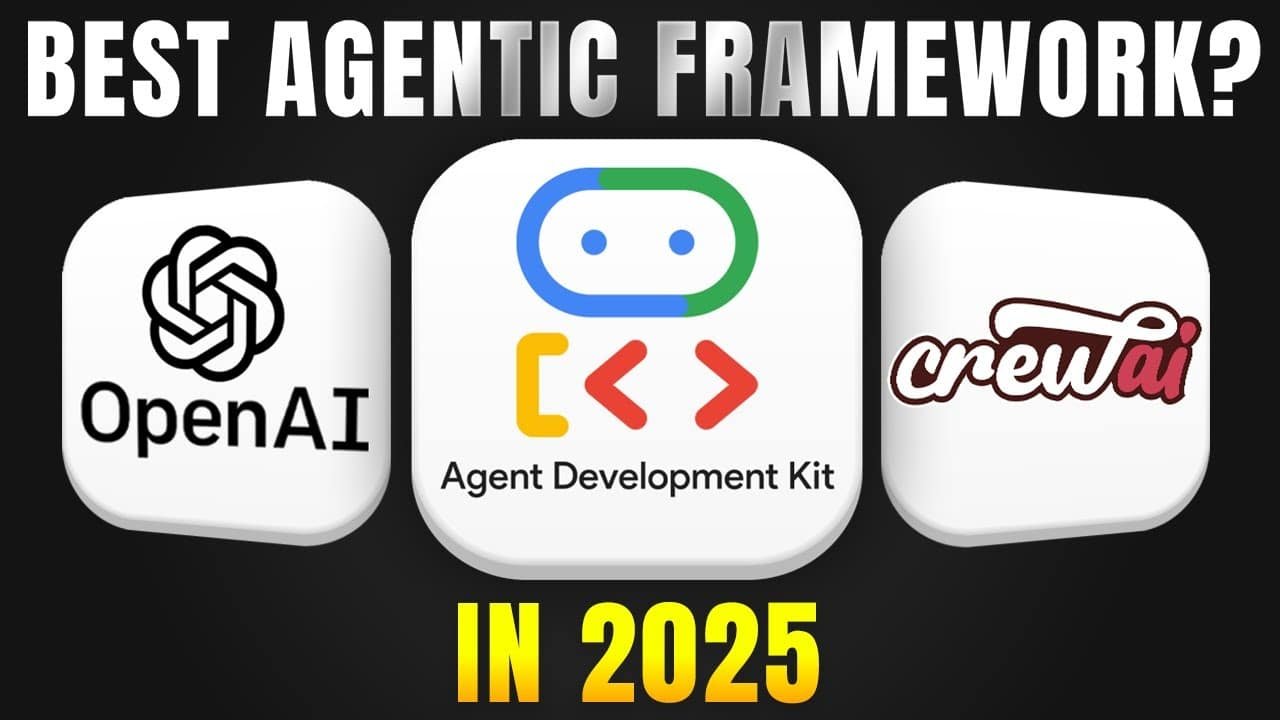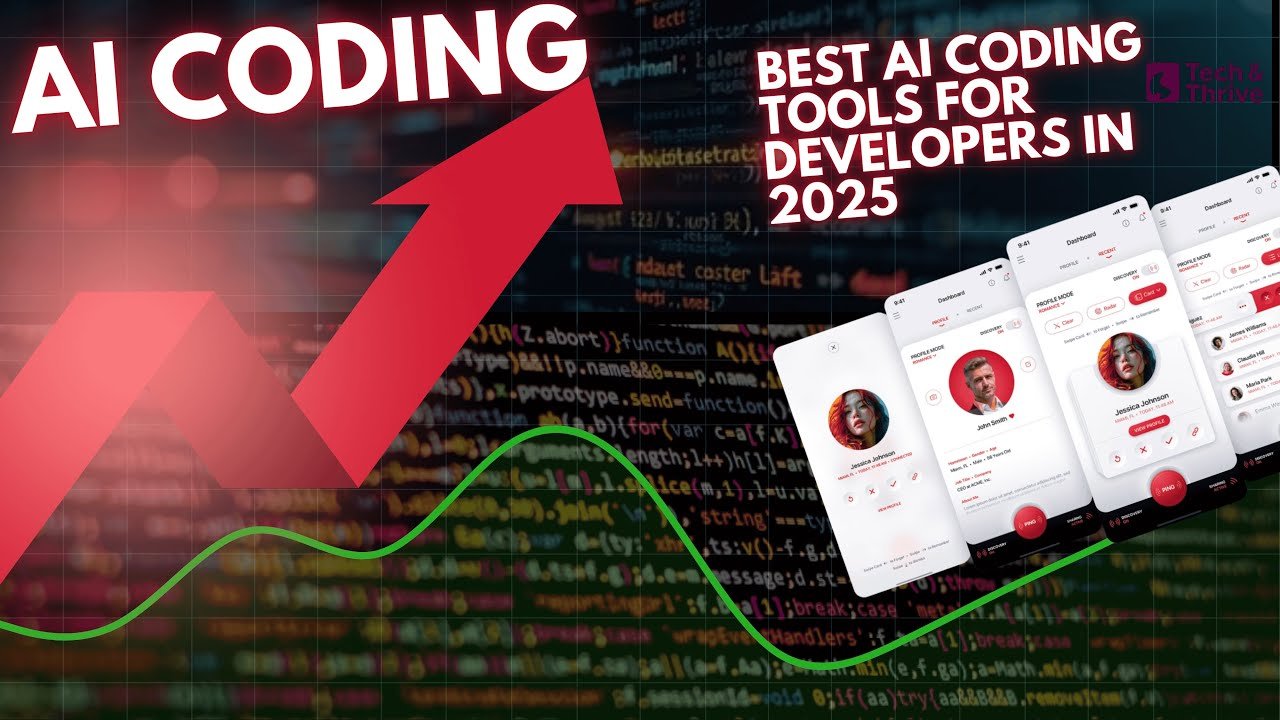Top AI Cloud Business Management Platform Tools 2025
Introduction

🌐 Understanding AI Cloud Business Management Platforms
In today’s fast-paced digital economy, businesses need more than traditional tools to remain competitive—they need intelligent, scalable systems that can adapt and grow with their needs. This is where AI cloud business management platforms come in. These platforms combine the power of Artificial Intelligence (AI) with the flexibility of cloud computing, offering a centralized solution to automate operations, analyze data, and streamline decision-making.
An AI cloud business management platform is essentially a suite of cloud-based tools that use AI technologies—such as machine learning, natural language processing, and predictive analytics—to manage core business functions. These can include everything from finance, marketing, and HR to customer relationship management and supply chain operations. By leveraging AI, these platforms not only automate repetitive tasks but also generate valuable insights from massive datasets in real time.
🤖 Why AI Matters in Business Management
The integration of AI in business is not just a trend—it’s a necessity. As companies handle increasing volumes of data and face rapidly shifting market conditions, AI provides the intelligence needed to adapt and thrive. Unlike traditional systems that require manual input and routine maintenance, AI systems can learn from patterns, predict outcomes, and optimize processes without constant human intervention.
According to a recent report by PwC, AI is expected to contribute $15.7 trillion to the global economy by 2030, with the biggest impact seen in productivity gains and consumer personalization. This indicates how crucial AI has become in modern business strategies, especially in decision-making, cost reduction, and scalability.
🚀 The Role of AI Cloud Platforms in Modern Business

Here’s how AI-powered cloud platforms are transforming business operations:
1. Operational Efficiency
AI cloud platforms can automate repetitive tasks, such as data entry, inventory tracking, and financial reporting. This not only saves time but also reduces human error, enabling staff to focus on strategic, high-impact tasks.
2. Enhanced Decision-Making
With real-time analytics and predictive modeling, businesses can make data-driven decisions faster. AI can identify trends, forecast demand, and recommend actionable strategies, helping managers and executives respond more effectively to change.
3. Improved Customer Engagement
By analyzing customer behavior and preferences, AI tools can personalize interactions across email, chat, and social media. This leads to higher customer satisfaction, increased loyalty, and better retention rates.
4. Scalability and Flexibility
Being cloud-based, these platforms are easily scalable. Whether a company has 10 employees or 10,000, the system can grow with them without requiring expensive infrastructure changes.
🔝 Top AI Cloud Business Management Platform Tools

In today’s digital-first business landscape, AI-driven cloud platforms are transforming how companies operate, make decisions, and engage with customers. These intelligent platforms combine the scalability of the cloud with the power of artificial intelligence (AI) to automate workflows, analyze massive datasets, and deliver personalized experiences.
Below, we explore some of the most powerful AI cloud business management platforms—used by global enterprises to increase productivity, enhance customer relationships, and streamline operations.

💼 1. Salesforce Einstein
Salesforce Einstein is the AI layer built into the Salesforce Customer 360 platform. It enhances Salesforce’s CRM capabilities with advanced AI and machine learning tools that support sales, marketing, customer service, and commerce functions.
🔑 Key Features:
AI-powered lead scoring and sales opportunity insights.
Automated data analysis to surface actionable trends.
Personalized customer interactions at scale.
Einstein Bots for automating service requests and customer engagement.
🤖 AI Use Cases:
Predictive sales forecasting to focus on high-value leads.
AI-powered customer service agents to handle routine queries.
Automated, personalized marketing campaigns based on user behavior.
✅ Why Businesses Love It:
Salesforce Einstein eliminates guesswork, allowing teams to act on real-time data and predictive insights that improve conversion rates and customer satisfaction.
🏢 2. Microsoft Dynamics 365
Microsoft Dynamics 365 is a comprehensive suite of cloud-based business applications that integrates CRM, ERP, and AI tools into a unified platform. It helps organizations manage sales, finance, supply chains, customer service, and more.
🔑 Key Features:
Embedded AI in apps like Sales, Marketing, and Customer Insights.
Power BI integration for advanced data visualization and reporting.
AI-driven workflow automation with Power Automate.
Intelligent customer service bots powered by Azure AI.
🤖 AI Use Cases:
End-to-end sales and marketing automation.
AI-based customer feedback analysis and case resolution.
Predictive financial modeling and demand forecasting.
✅ Why Businesses Love It:
Dynamics 365 offers modular flexibility, allowing businesses to start small and scale their AI capabilities across multiple departments.
☁️ 3. Oracle Cloud AI
Oracle Cloud AI brings enterprise-grade AI to cloud-based business applications. Oracle has infused AI into its entire suite—ranging from finance and HR to marketing and procurement—to help businesses work smarter.
🔑 Key Features:
AI for human capital management (HCM), recruitment, and workforce planning.
Predictive analytics for customer behavior and sales trends.
Advanced machine learning capabilities and AI model training.
Process automation using Oracle Digital Assistants and bots.
🤖 AI Use Cases:
Intelligent HR analytics and talent matching.
AI-driven marketing automation for personalized outreach.
Real-time financial forecasting and risk management.
✅ Why Businesses Love It:
Oracle Cloud AI enhances agility and reduces manual effort across business functions—making it ideal for large organizations with complex workflows.
⚙️ 4. SAP Leonardo
SAP Leonardo is SAP’s digital innovation system that integrates cutting-edge technologies like artificial intelligence (AI), machine learning (ML), Internet of Things (IoT), and advanced analytics into a single platform. Designed for large enterprises, Leonardo empowers organizations to rapidly transform their operations with real-time intelligence and automation.
🔑 Key Features:
End-to-end AI-driven process automation for finance, logistics, HR, and more.
Real-time data processing and predictive analytics.
Seamless integration with SAP S/4HANA ERP systems.
🤖 AI Use Cases:
Smart supply chain automation that predicts disruptions and adapts in real time.
Predictive maintenance for equipment and assets using sensor data.
AI-powered workforce analytics to identify performance trends and optimize HR strategies.
✅ Why Businesses Love It:
SAP Leonardo enables smarter enterprise planning and faster execution, helping global businesses unlock the full potential of intelligent operations.
🧠 5. IBM Watson
IBM Watson is a pioneer in enterprise AI. With powerful capabilities in natural language processing, machine learning, and data analysis, Watson is widely used across industries to enhance decision-making, automate workflows, and personalize customer experiences.
🔑 Key Features:
Intelligent chatbots and virtual assistants for customer and employee support.
Advanced data and sentiment analysis using Watson Discovery.
Cognitive computing for complex decision-making tasks.
🤖 AI Use Cases:
Automated customer service via Watson Assistant.
Market research and sentiment analysis for brand perception.
AI-powered business intelligence and risk analysis.
✅ Why Businesses Love It:
Watson helps businesses handle large-scale data with human-like understanding, turning unstructured content into powerful business insights.
🤖 6. Zoho AI (Zia)
Zia is the smart AI assistant built into Zoho’s CRM and business suite. Zia acts like a virtual sales and marketing analyst—helping businesses automate daily tasks, gain real-time insights, and improve customer engagement without heavy technical setup.
🔑 Key Features:
AI-powered lead scoring and deal predictions.
Conversational analytics and smart alerts via NLP.
Automation of email marketing and customer workflows.
🤖 AI Use Cases:
Sales forecasting based on past data and trends.
Email sentiment analysis for better campaign planning.
Intelligent customer insights to tailor sales strategies.
✅ Why Businesses Love It:
Zia is ideal for small and mid-sized businesses looking for an intuitive, cost-effective AI solution that works out of the box.
☁️ 7. Google Cloud AI
Google Cloud AI provides developers and businesses with a robust set of tools for machine learning, data analysis, and AI development. It’s known for its scalability, flexibility, and strong pre-trained models in areas like NLP, vision, and translation.
🔑 Key Features:
AutoML for building custom AI models with minimal coding.
Vision AI, Speech-to-Text, and Natural Language APIs.
Tight integration with BigQuery for advanced data analysis.
🤖 AI Use Cases:
Natural language understanding for chatbots and support systems.
Image and video recognition for retail, security, and marketing.
Predictive analytics for customer behavior, fraud detection, and more.
✅ Why Businesses Love It:
Google Cloud AI offers enterprise-grade capabilities with a developer-friendly approach—perfect for businesses looking to scale their AI strategy quickly.
💡 8. HubSpot AI
HubSpot is one of the most popular CRM platforms, well-known for its user-friendly interface and all-in-one marketing, sales, and service capabilities. With the integration of artificial intelligence, HubSpot enhances how businesses manage customer relationships, automate tasks, and personalize communication across the funnel.
🔑 Key Features:
AI-powered email marketing for smart personalization and timing.
Predictive lead scoring to prioritize high-value prospects.
Conversational chatbots for customer support and qualification.
🤖 AI Use Cases:
Creating personalized email campaigns based on user behavior.
Sales forecasting to guide strategy and resource allocation.
24/7 AI chatbots that reduce response time and improve service quality.
✅ Why Businesses Love It:
HubSpot’s AI features are built directly into its free and premium tools, making it easy for startups and growing businesses to access the power of automation without complex coding or setup.
🔄 9. Pega Systems
Pega is a powerful business process management (BPM) and customer engagement platform. It uses AI and decision science to help organizations streamline operations, automate decision-making, and deliver hyper-personalized customer experiences in real time.
🔑 Key Features:
AI-powered decisioning engine for real-time next-best actions.
Predictive analytics to forecast customer behavior and business outcomes.
Intelligent workflow and process automation tools.
🤖 AI Use Cases:
Automating complex business workflows in finance, insurance, and healthcare.
Customer service decisioning, such as suggesting responses or actions based on sentiment.
Forecasting trends with advanced AI analytics.
✅ Why Businesses Love It:
Pega stands out in industries where rules-based systems meet AI-driven recommendations, offering unmatched flexibility for both structured and dynamic business processes.
💬 10. Freshworks AI (Freddy AI)
Freshworks, with its AI assistant Freddy AI, brings intelligent automation to CRM, IT service, customer support, and HR solutions. It’s widely used by businesses seeking smart customer engagement and faster internal operations without the enterprise-level complexity.
🔑 Key Features:
Freddy AI-powered chatbots for automated conversations.
Sales intelligence tools like predictive lead scoring and email insights.
AI-led workflow automation across support, sales, and marketing teams.
🤖 AI Use Cases:
Customer service automation using Freddy bots with contextual understanding.
Lead qualification and sales prioritization based on AI scoring.
Data-driven marketing campaigns based on customer behavior and engagement.
✅ Why Businesses Love It:
Freshworks is ideal for growing companies that want AI features out-of-the-box without needing large IT teams—making AI adoption seamless and cost-effective.
🧠 How to Choose the Right AI Cloud Business Management Platform for Your Business

Choosing the ideal AI-powered cloud business platform can significantly impact your company’s efficiency, customer satisfaction, and growth. With many options available, here are the key factors to consider when making your decision:
1. 🔄 Scalability
Make sure the platform can grow with your business. As your operations expand, your AI platform should handle increased data volume, user activity, and complex workflows without performance issues.
2. ⚙️ Customization
Every business is unique. Look for platforms that allow you to customize workflows, dashboards, AI models, and automation rules to align with your specific processes and industry needs.
3. 🔗 System Integration
Seamless integration with your current tools (like CRMs, ERPs, marketing software, and communication tools) is vital. The right platform should connect effortlessly with your existing ecosystem to avoid data silos and increase productivity.
4. 👩💻 Ease of Use
A user-friendly interface and intuitive design ensure that your team can adopt the platform quickly without steep learning curves. A well-designed UI increases efficiency and reduces the need for extensive training.
5. 📞 Customer Support
Reliable support can make or break your experience. Choose a provider that offers responsive customer service, onboarding assistance, comprehensive documentation, and access to expert support when needed.
How to Choose the Right AI Cloud Business Management Platform
| 🔍 Factor | 💡 Description | 🚀 Why It Matters |
|---|---|---|
| Scalability | Supports your business as it grows and evolves. | Future-proofs your tech stack—no need to switch platforms later. |
| Customization | Lets you tailor features and workflows to your needs. | Boosts productivity by aligning with your unique operations. |
| Integration | Connects easily with your existing tools and systems. | Saves time and reduces errors with seamless data syncing. |
| Ease of Use | User-friendly dashboard and navigation. | Makes onboarding simple and keeps teams efficient. |
| Customer Support | Access to responsive and knowledgeable support teams. | Ensures quick problem resolution and peace of mind. |
🌐 Future Trends in AI Cloud Business Management Platforms
In today’s fast-paced digital economy, artificial intelligence (AI) has already revolutionized how businesses manage operations, customer interactions, and decision-making. But we’re only scratching the surface. The future of AI cloud business management platforms holds even more transformational potential — from conversational AI to autonomous decision systems, businesses are on the verge of operating smarter, faster, and more intuitively than ever before.
In this article, we explore the emerging trends shaping the future of AI-powered cloud business platforms, helping organizations stay ahead of the curve and build intelligent, scalable systems.
🔮 1. Conversational AI Will Dominate Business Interactions
AI-powered chatbots and virtual assistants are becoming more sophisticated thanks to advancements in natural language processing (NLP) and generative AI. In the future, conversational AI tools like ChatGPT Enterprise, Google Dialogflow, and Azure Bot Services will handle not only customer support but also internal queries, task automation, and team collaboration.
These bots will move beyond scripted responses, offering real-time, human-like conversations. For example, employees will be able to ask AI assistants to generate reports, schedule tasks, or retrieve business insights — all through simple voice or text commands.
Impact:
Faster internal processes
Improved customer service 24/7
Reduced manual workload on staff
🧠 2. Autonomous Decision-Making Will Streamline Workflows
Autonomous AI systems, powered by reinforcement learning and predictive modeling, are beginning to make decisions without human intervention. These AI systems learn from data patterns and outcomes to continuously optimize business processes.
For instance, future AI platforms will autonomously manage inventory, pricing, and supply chains, reacting to real-time market changes or consumer behavior — without needing manual triggers.
Example Use Cases:
Automated dynamic pricing in eCommerce
Intelligent workload balancing in cloud infrastructure
Self-adjusting marketing campaigns based on performance
🧩 3. Deeper Integration Across Enterprise Ecosystems
Current AI platforms often work in silos or require complex integrations. The future is heading toward full interoperability with enterprise ecosystems like ERP, CRM, HRMS, and finance tools. Unified platforms will allow AI to pull data from multiple sources to provide a 360-degree view of the business.
Platforms like Salesforce Einstein, Microsoft Dynamics 365 AI, and SAP Business AI are already moving in this direction, embedding AI deeply across all business units.
Benefits:
Unified data insights
Reduced fragmentation
Centralized control and intelligence
🛡️ 4. Responsible AI and Data Governance Will Be Essential
As AI becomes more central to business operations, trust, privacy, and compliance will be critical. The future will demand stricter AI governance, transparency, and ethical frameworks. Businesses will adopt Explainable AI (XAI) models that provide clear justifications for decisions made by algorithms.
Compliance with GDPR, CCPA, and future AI regulations will be embedded into platforms as default features, ensuring businesses stay on the right side of the law.
Why It Matters:
Builds customer and stakeholder trust
Avoids legal and ethical issues
Ensures fair, unbiased AI decisions
🔧 5. Hyper-Personalization with AI-Driven Insights
Future AI platforms will unlock hyper-personalization at scale — going beyond simple user segmentation to create real-time, individual experiences across marketing, sales, and support. By analyzing behaviors, preferences, and purchase history, AI will deliver unique offers, messages, and content to each user.
This level of personalization is being seen in tools like Adobe Sensei, Zoho Zia, and Freshworks Freddy AI, and it’s only getting better.
Real-World Applications:
Personalized customer portals
Dynamic product recommendations
Custom sales journeys for every lead
📈 6. Democratization of AI with No-Code Platforms
One of the most exciting trends is the democratization of AI — making it accessible to non-developers through no-code/low-code AI platforms. Business users will be able to build AI workflows, predictive models, and automation tools without writing a single line of code.
Platforms like Google AutoML, Microsoft Power Platform, and Zoho Creator are paving the way for this user-friendly future.
What It Means:
Broader team adoption of AI
Faster innovation cycles
Reduced reliance on IT teams
🧩 Conclusion: Prepare Your Business for an AI-Driven Future
The AI cloud business management platforms of the future will be smarter, faster, and more integrated than ever. From autonomous workflows to deeply personalized customer experiences, the evolution of AI will empower businesses to operate at a whole new level of efficiency and intelligence.
To stay competitive, organizations must:
Invest in flexible and scalable AI platforms
Train teams to work with AI tools
Focus on ethical and responsible AI practices
Embracing these future trends today can position your business for sustainable growth, innovation, and market leadership tomorrow.
FAQ – Top AI Cloud Business Management Platform Tools
1. What is an AI Cloud Business Management Platform?
An AI cloud business management platform is a software solution that combines artificial intelligence (AI) with cloud computing to streamline and optimize various business functions such as sales, marketing, customer service, supply chain management, and more. These platforms use AI technologies like machine learning and predictive analytics to automate processes, provide real-time insights, and help businesses make data-driven decisions.
2. How can AI help businesses improve decision-making?
AI helps businesses improve decision-making by analyzing vast amounts of data, identifying patterns, and providing actionable insights. Machine learning models and predictive analytics enable businesses to forecast trends, make smarter decisions, and gain a competitive edge by making data-driven choices rather than relying on intuition or incomplete information.
3. What are the key benefits of using AI in business management?
Some of the key benefits of using AI in business management include:
Automation: AI automates routine tasks, saving time and reducing human error.
Improved efficiency: AI streamlines business operations, making processes faster and more efficient.
Cost savings: Cloud-based AI platforms reduce the need for expensive on-premises infrastructure.
Personalization: AI helps businesses deliver personalized experiences to customers at scale.
Enhanced customer experience: AI-driven tools such as chatbots and predictive analytics improve how businesses engage with customers.
4. What are some examples of AI cloud business management platforms?
Some of the top AI cloud business management platforms include:
Salesforce Einstein: AI integrated with Salesforce CRM for predictive analytics and automation.
Microsoft Dynamics 365: A suite of cloud applications with AI capabilities for sales, customer service, and finance.
Oracle Cloud AI: AI tools for automation, predictive analytics, and machine learning across business functions.
SAP Leonardo: A platform that combines AI, IoT, and big data to transform business processes.
IBM Watson: Cognitive computing and machine learning tools for business automation and customer engagement.
5. How do AI platforms help improve customer experience?
AI platforms enhance customer experience by providing personalized interactions, improving response times, and delivering data-driven insights. For example, AI-powered chatbots can instantly address customer queries, while predictive analytics can help businesses anticipate customer needs and tailor marketing efforts accordingly.
6. Are AI cloud platforms suitable for small businesses?
Yes, many AI cloud platforms are scalable and customizable, making them suitable for businesses of all sizes, including small businesses. Cloud-based AI solutions often have lower upfront costs and can be scaled as needed, making them accessible to small businesses looking to leverage AI without the need for expensive infrastructure or large teams.
7. What factors should businesses consider when choosing an AI cloud business management platform?
When choosing an AI cloud platform, businesses should consider:
Business needs: Identify specific use cases like sales automation, customer service, or predictive analytics.
Scalability: Ensure the platform can grow with your business.
Ease of use: Look for platforms with user-friendly interfaces and strong support.
Integration: Make sure the platform integrates well with your existing software and systems.
Cost: Evaluate pricing models and ensure the platform fits within your budget.
8. How does AI cloud business management improve workflow automation?
AI platforms automate repetitive tasks such as data entry, customer inquiries, and reporting. By using AI-driven workflows, businesses can reduce manual effort, streamline operations, and ensure consistency in processes. For instance, AI-powered chatbots can handle customer queries, while machine learning models can automatically route tasks to the right teams.
9. Can AI cloud platforms help in sales forecasting?
Yes, AI cloud platforms use predictive analytics to forecast sales, allowing businesses to plan and allocate resources more effectively. By analyzing historical data and identifying patterns, AI tools can generate accurate sales predictions, helping companies understand future demand and optimize their sales strategies.
10. What are the future trends for AI cloud business management platforms?
The future of AI in cloud business management looks promising, with advancements in areas such as:
Conversational AI: More intelligent chatbots and virtual assistants.
Autonomous decision-making: AI systems that can make decisions without human intervention.
Deeper integration: AI platforms will integrate further with enterprise resource planning (ERP) and customer relationship management (CRM) systems.
AI-driven innovation: New AI technologies and tools will emerge to further enhance business processes and customer engagement.
11. How do AI cloud platforms help businesses save costs?
AI cloud platforms save businesses money by eliminating the need for costly on-premises infrastructure and reducing maintenance expenses. Additionally, AI automation decreases labor costs by handling repetitive tasks and improving efficiency. By offering pay-as-you-go models, cloud platforms allow businesses to only pay for the resources they use, further cutting costs.
12. Is AI in cloud business management secure?
Yes, security is a top priority for most AI cloud business management platforms. Leading platforms like Salesforce, Microsoft, and Oracle invest heavily in encryption, data protection, and compliance with industry standards. However, businesses should still ensure they follow best practices for data security and privacy when using cloud-based AI tools.
Interested to read more ?
1. Topic: AI for business growth
💡 Add this link when mentioning how AI helps scale or grow a business:
👉 “AI tools are now central to business growth.”
➡
2. Topic: AI tools for automation or alternatives
💡 When discussing affordable or free alternatives to AI platforms:
👉 “Businesses can use paid or free AI tools depending on their needs.“
3. Topic: No-code AI business tools
💡 When covering ease of use or building tools without coding knowledge:
👉 “Even non-tech users can now build apps using no-code AI solutions.“
Final Thoughts: Unlocking the Power of AI in Cloud Business Management
AI cloud business management platforms are no longer optional — they are essential tools in the modern digital economy. These intelligent systems have transformed how businesses operate, empowering leaders with real-time insights, predictive analytics, and automated workflows that drive growth and innovation.
With years of collective advancement in AI, machine learning, and cloud technologies, today’s platforms like Salesforce Einstein, Microsoft Dynamics AI, Google Cloud AI, and Zoho Zia offer unparalleled capabilities to streamline operations, enhance customer engagement, and fuel smarter decision-making.
Choosing the right AI cloud platform starts with understanding your business needs. Evaluate factors such as scalability, integration flexibility, ease of use, and data security. Platforms that align with your existing infrastructure and offer future-ready capabilities will ensure long-term value and a competitive edge.
🌟 Why It Matters:
For entrepreneurs: Gain automation and analytics to scale faster
For enterprises: Drive digital transformation with intelligent decision-making
For tech teams: Reduce manual overhead and unlock data-driven innovation
As the future of AI continues to evolve — with trends like conversational AI, autonomous systems, and hyper-personalization — businesses that act now will be best positioned to lead in their industries. With a responsible and strategic approach, AI becomes not just a tool, but a powerful partner in your organization’s success.










